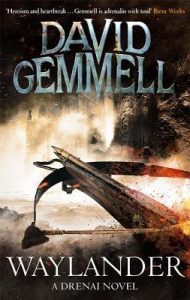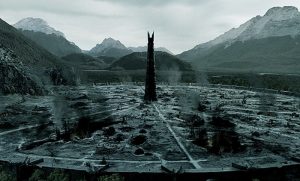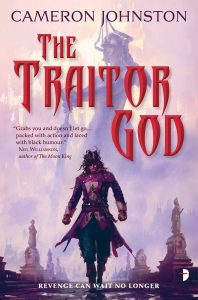Love in the Age of Grimdark (Guest Post by Cameron Johnston)
It’s no secret that I am a huge fan of gritty, dark fantasy novels with morally grey and flawed characters, which is probably why I ended up writing one myself. The self-proclaimed Good Guys are not all good and supposed Bad Guys are not all bad; instead, characters tend to be more nuanced, like real people, and usually ones that have landed in some sort of hellish situation.
 I find it compelling to follow characters who make mistakes, get hurt, suffer, and still try to muddle through everything that life can throw at them. I like the gritty authenticity and a reader’s fear of an indifferent world that doesn’t care if characters live or die (*cough* Red Wedding *cough*) and the danger that brings to anybody living in it. Wounds can kill if not treated, accidents happen, as can gut-wrenching betrayal. And yet, I tend to find grimdark stories that revel in how completely grim and dark they are monotonous and dreary. That is not what I want from grimdark fiction. Please give me at least a little light in all that relentless crushing darkness, ‘K, thanks.
I find it compelling to follow characters who make mistakes, get hurt, suffer, and still try to muddle through everything that life can throw at them. I like the gritty authenticity and a reader’s fear of an indifferent world that doesn’t care if characters live or die (*cough* Red Wedding *cough*) and the danger that brings to anybody living in it. Wounds can kill if not treated, accidents happen, as can gut-wrenching betrayal. And yet, I tend to find grimdark stories that revel in how completely grim and dark they are monotonous and dreary. That is not what I want from grimdark fiction. Please give me at least a little light in all that relentless crushing darkness, ‘K, thanks.
I grew up reading about the adventures of goody-goody hero farmboys with magic swords on quests to defeat evil dark lords who were so evil and dark and lordly they might as well have had the floors of their overly-phallic brooding black towers carpeted in dead puppies and kittens. All the swear words were ‘By the beard of Odin!’ or similar (while the hero was happily slaughtering innocent guards just doing their job) and the bad guys never had any recruitment problems despite offing their most loyal and efficient minions at any given opportunity. After a while that grew very samey. I was looking for something a little darker, so in the 90s I stopped reading fantasy for a few years and instead mostly read mostly space opera. When I came back to fantasy I discovered David Gemmell’s often proto-grimdark novels, which I feel captures a huge part of what I really want in darker fantasy: namely, those moments where horrible characters who do dreadful things find a spark of love and hope still within them, or refuse to cross a certain line, and sometimes, even for a single fatal moment, they become a hero. Those moments were golden. On the flip side, Gemmell also wrote incredibly flawed ‘hero’ characters like Druss the Legend and Waylander that dragged me into the story and never let go.
 The heart of the issue I have with some grimdark fiction is of characters losing all love, humour and hope. The world they are in might be a horrible place but if a main character has none of those, cares about nothing more than themselves, and I expect people to betray each other at every opportunity, then as a reader I don’t think I want to read on. It would be like reading Lord of The Rings but everything is set in the grey and drab land of Mordor, the Fellowship are all irredeemably evil humourless orcs, and Gandalf is merely a crack pipe-addicted beardy con man that wants the One Ring for himself – and everything is all so very knowingly ‘gritty’ and earnest. Without seeing the Shire as a contrast to Mordor and experiencing the Fellowship’s trust and sacrifice for each other, and without Frodo’s inner struggle to resist the darkness growing in his heart, you have a shallower and less emotionally-affecting story.
The heart of the issue I have with some grimdark fiction is of characters losing all love, humour and hope. The world they are in might be a horrible place but if a main character has none of those, cares about nothing more than themselves, and I expect people to betray each other at every opportunity, then as a reader I don’t think I want to read on. It would be like reading Lord of The Rings but everything is set in the grey and drab land of Mordor, the Fellowship are all irredeemably evil humourless orcs, and Gandalf is merely a crack pipe-addicted beardy con man that wants the One Ring for himself – and everything is all so very knowingly ‘gritty’ and earnest. Without seeing the Shire as a contrast to Mordor and experiencing the Fellowship’s trust and sacrifice for each other, and without Frodo’s inner struggle to resist the darkness growing in his heart, you have a shallower and less emotionally-affecting story.
 I find the most compelling characters tend to be capable of both love and hate, like Glokta the disabled torturer in Joe Abercrombie’s First Law series – a nasty man doing brutal deeds but possessing such wit and quips and shreds of decency that we forgive him almost anything. Written only slightly differently, Scott Lynch’s The Lies of Locke Lamora could have been deeply grimdark if the Gentlemen Bastards didn’t love each other and possess a rare sense of fun and humour. Glen Cook’s Black Company novels are dark indeed and not shy of showing war’s atrocities, but between battles the characters kick back and make fun of each other with childish pranks that lighten things up, and for me feels all the more genuine for it. In their own unique ways these characters bring the reader both darkness and light and the story is improved because of it.
I find the most compelling characters tend to be capable of both love and hate, like Glokta the disabled torturer in Joe Abercrombie’s First Law series – a nasty man doing brutal deeds but possessing such wit and quips and shreds of decency that we forgive him almost anything. Written only slightly differently, Scott Lynch’s The Lies of Locke Lamora could have been deeply grimdark if the Gentlemen Bastards didn’t love each other and possess a rare sense of fun and humour. Glen Cook’s Black Company novels are dark indeed and not shy of showing war’s atrocities, but between battles the characters kick back and make fun of each other with childish pranks that lighten things up, and for me feels all the more genuine for it. In their own unique ways these characters bring the reader both darkness and light and the story is improved because of it.
That spark of light and love might help illuminate the terribly grim darkness, but it also casts powerful shadows, and I find it all the more impactful when a character I have grown to like does something awful. Sometimes good characters have to make terrible choices, and then they pay for it. That, to me, is one of the things that grimdark fiction does best.
